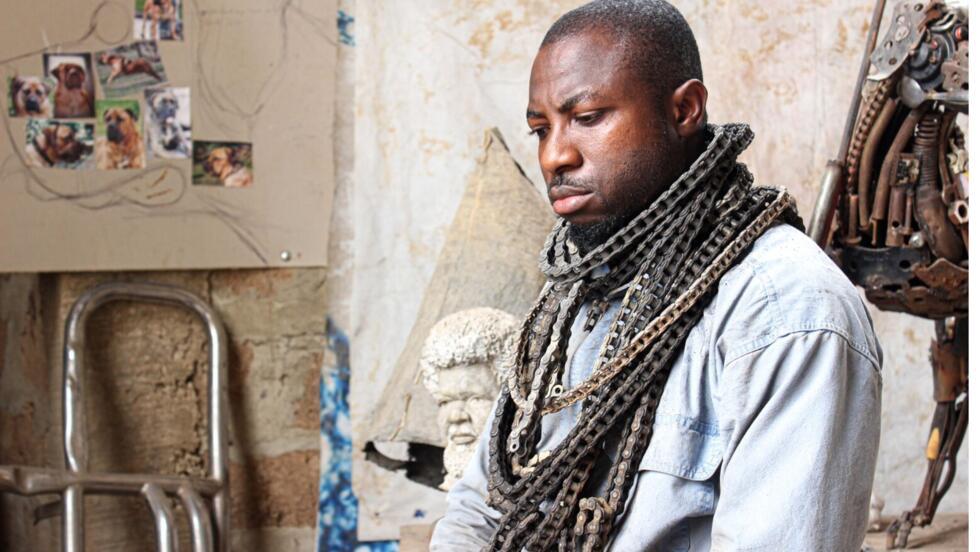Leaving chaos for calm: Lagosian sculptor thrives in historic Ìlẹ́-Ìfẹ́ town
On a Saturday in internationally renowned sculptor Dotun Popoola’s studio, domestic tourists have made the three-hour exodus from Lagos to see his works and listen to him talk about his art.
Issued on:

Popoola, whose main medium is scrap metal, is based in the ancient town of Ìlẹ́-Ìfẹ́, a historically significant place for Yoruba people. It is also famous for its beautiful bronze, stone, and terracotta sculptures.
The artist was born and raised in Lagos, but says he made a conscious effort to leave Africa’s most populous city and find inspiration elsewhere.
“I don’t want to spend all day in traffic and I don’t want the noise of my neighbor, except the noise of my birds,” he tells Africa Calling correspondent Samuel Okocha.
He went to Ìlẹ́-Ìfẹ́ for school and enjoyed the lack of distraction, which he believes inspires his creativity.
In his workshop, where he also mentors 10 young artists, he strikes metal scraps, as he moves the material into the shape he wants.
“I use my work as a metaphor to protest the issue of waste in our environment and the need to repurpose them to something magnificent that you can see and appreciate,” says Popoola.
“There are different kind of ways that people recycle scraps. Some recycle, some upcycle. What I do is more of upcycling.”
Noise v quiet
In Ikeja, Lagos, artist and curator Ifeanyichukwu Oraemeka says she shares Popoola’s sentiments in finding inspiration from silence, although Lagos can be stimulating as well.
“There’s a whole lot of inspiration that comes from peace and quiet. Inspiration can come from noise. Don’t get me wrong, but there are different types of noise,” she says.
While Ifeanyi encourages artists to explore other cities for their quiet environment, she is quick to add that Lagos remains Nigeria’s hub for arts and exhibitions. It provides some form of inspiration, which artists can take inspiration from.
“When artists come for exhibitions that I have curated they get inspired and say, ‘I think I can do this. I think I can exhibit my work,’” she says.
“If they had not come out of their places they may not have gotten that inspiration. So Lagos is the hub,” she adds.
Art economy comes to Ìlẹ́-Ìfẹ́
Working so far from the creative hub of Lagos could be a hindrance, but for Popoola, it makes sense, especially because Nigerians have taste and money.
“Nigeria can buy anything,” he says, adding that Nigerians are becoming active players in the global art markets.
He has had a number of exhibitions in the United States in the past, where he registers with a gallery, which takes 50 percent of the sales. But it’s not always the best place to show his art.
“If I sell my work in Nigeria, one young boy from an estate that is not even known in Lagos can bring solid cash, meanwhile someone in America will still tell you ‘can I do a payment plan?’ I doubt I have a time for payment plan. I just want to make my money,” he says.
As the world is gaining an appetite for African art, some Nigerians are beefing up their art collections.
“The world is buying African art big time. You see Njideka Akunyili selling just one piece of art for three, four, five million dollars,” he says.
“African art is growing, but for me I think the home market will take care of me for now then prepare me for the future,” he adds.
As Popoola prepares for the future, he is carrying others along, providing mentorships to younger artists looking to find their own voice. Christiana Balogun, a female welder, is one of ten artists working as apprentices in Popoola’s studio.
“One thing I am looking forward to taking away once I am done here is confidence. Because it’s the way Mr Popola speaks, he speaks with confidence,” says Balogun, who admits she usually doesn’t talk.
“I don’t have that confidence, but looking at him and talking to him has actually built my self-esteem to a certain stage and I am looking forward to building more on that,” she adds.
With Nigeria projected to become the third most populous country in the world before 2050, more artists like Popoola are interested in places with fewer distractions.
That means more artists and their arts living in, and taking inspiration from, more rural settings of Africa’s most populous country.
This story was originally heard on RFI's Africa Calling podcast.
Daily newsletterReceive essential international news every morning
Subscribe